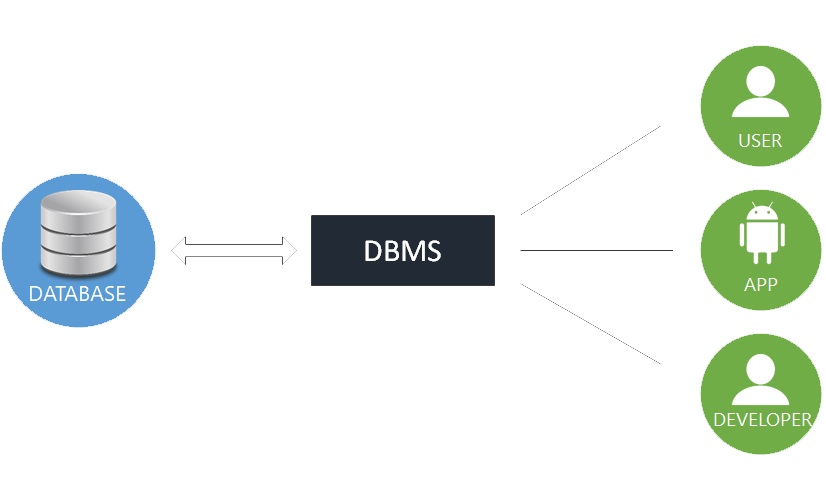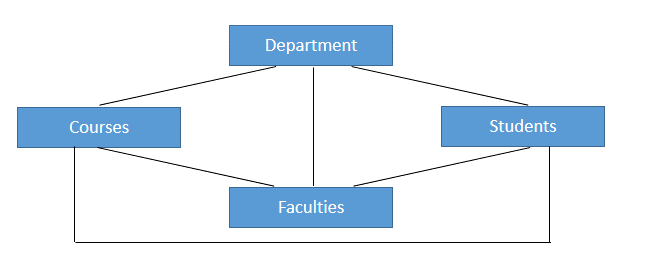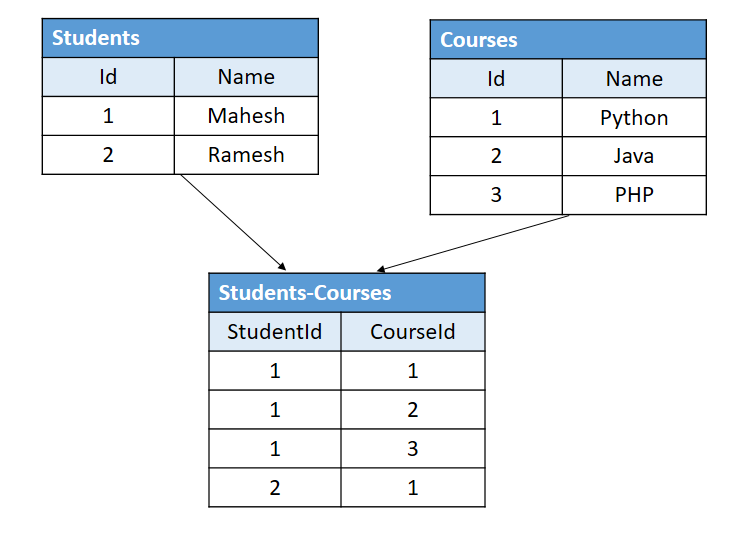મિત્રો, આ Tutorial માં આપણે શીખીશું What is DBMS in Gujarati? User’s ના પ્રકાર અને તે DBMS ની મદદ થી શું કરી શક્શે? DBMS પ્રકાર કેટલા છે, તેના ફાયદા અને ગેરફાયદા. DBMS ની વિશેષતા શું છે? તેની મદદ થી કઇ કઇ Applications બનાવી શકિયે? DBMS નો use કરવા શું હોવું જરૂરી છે? DBMS અને file system વચ્ચે નો તફાવત. (What is DBMS, Type of users and What User can do with dbms, Types of DBMS, Advantages and Disadvantages of dbms, Characteristics of DBMS, Applications of DBMS, Components of DBMS, Difference between dbms and file system).
What is DBMS in Gujarati (DBMS શું છે)

- DBMS = Database + Set of programs
- Database Management System (DBMS) એ એક પ્રકાર નુ software છે જે security ને ધ્યાનમાં રાખીને user ના data or inter-related (એક્સાથે જોડાયેલા) data) ને store (સંગ્રહ) અને retrieve (પાછા મેળવવા) માટે use થાય છે.
- તે ઘણા બધા programs નુ group છે, જે database માં manipulation(હેરફેર) કરે છે.
- DBMS એ application અથવા user ને specific data provide કરવા માટે, સૌથી પેહલા તેમના પાસે થી data ની request લેય છે અને operating system ને જણાવે છે.
- In large systems, DBMS એ users અને બીજા third-party software ને data store અને retrieve કરવા માટે મદદ કરે છે.
- DBMS એ user ની જરૂરીયાત મુજબ તેનો પોતનો database બનાવવા માટે allow કરે છે.
Type of users and What User can do with dbms (User’s ના પ્રકાર અને તે DBMS ની મદદ થી શું કરી શક્શે?)
- અહીં જુદિ જુદિ category ના users છે અને તે શું કરી શકે છે તે નીચે મુજબ દર્શવેલ છે.
- Application Programmers:
- તે જુદિ જુદિ programming languages માં programs લખે છે અને database શાથે interact કરે છે.
- Database Designer:
- Database designer એ database નું detailed design નક્કિ કરવા માટે responsible છે. જેમા tables, indexes, views, constraints, triggers, stored procedures અને બીજા database ને લગતા constraints. વગેરે નો સમાવેશ થાય છે, જે objects ને store, retrieve અને delete કરવા માટે જરૂર પડે છે.
- Database Administrators:
- તેને આપણે database admin અથવા DBA પણ કહિયે છીયે. તે entire dbms system ના managing માટે responsible છે.
- End-Users:
- End-User એટલે એવો માણસ કે જે dbms સાથે interact કરે અને જુદા જુદા operations perform કરે. Operation જેવાકે insert, update, delete, retrieve etc.
- Application Programmers:
Types of DBMS (DBMS ના પ્રકાર)
- DBMS ના main ચાર પ્રકાર છે:
- Hierarchical database
- Network database
- Relational database
- Object-Oriented database
1. Hierarchical DBMS:

- Hierarchical database model માં data ને tree જેવા structure માં arrange કરવા માં આવે છે.
- અહીં data ને hierarchical(top-bottom or bottom-up) format માં store કરવામાં આવે છે.
- Data ને parent અને child ની relationship દ્વારા દર્શાવવામાં આવે છે. Parents ને many children હોઈ શકે છે, but children ને only one જ parent હોય છે. જેને આપણે one-to-many relation તરીકે ઓળખીયે છિયે.
- For example, એક department માં many students અને many faculties હોઈ શકે.
2. Network Model:

- Network model એ hierarchical model નુ extension જ છે. જે tree જેવા structure માં many-to-many relationship allow કરે છે.
- અહીં child ને multiple parents હોઈ શકે છે.
- આ model માં entities(tables) ને graph માં organize કરી જુદા જુદા path થી access કરવામાં આવે છે.
3. Relational Model:

- Relational dbms એ most widely use થતું dbms model છે, કારણકે તે easy છે.
- આ model માં data ને table માં row અને column ના form માં normalize(store) કરવામાં આવે છે.
- Relational model ને એક fixed structure માં store કરવામાં આવે છે અને SQL (Structured Query Language) દ્વારા તેને manipulate કરવામાં આવે છે.
- અહીં relationship, common attributes ને store કરી ને maintain કરવામાં આવે છે.
4. Object-Oriented Model:
- અહીં data ને object ના form માં store કરવામાં આવે છે. અને જે structure માં હોય છે તેને class કહેવામા આવે છે.
- તે DBMS નો એક component છે. જે database ને object ના collection તરીકે define કરે છે અને data member ની values અને operations ને store કરે છે.
Advantages and Disadvantages of dbms (DBMS ના ફાયદા અને ગેરફાયદા)
Advantages:
- DBMS એ data ને store અને retrieve કરવા જુદી જુદી techniques offer કરે છે.
- DBMS એ ઘણા powerful functions નો use કરી data ને store કરે છે અને પાછા મેળવે છે.
- DBMS એ data ની quality અને accuracy ને maintain રાખવા integrity constraint નો use કરે છે. For example, Banking system માં balance zero (0) થી ઓછું ન થવુ જોઇએ.
- તે ઘણી બધી security features પણ આપે છે, જેવીકે user authentication, access control અને unauthorized(અંજાન) access થી data ને બચાવવા data encryption વગેરે.
- તેની પાસે એક mechanism છે જેનાથી તે data નું concurrent access manage કરે છે.
- તેની મદદ થી application નું development ઝડપી થાય છે.
- DBMS એ એક efficient handler તરીકે help આપે છે. જે એક જ ડેટાનો ઉપયોગ કરી રહ્યા વધુ application ની જરૂરિયાતોનો સમયની રીતે સંતુલન રાખવામાં મદદ કરે છે.
- DBMS એ data નું administering કરવા એક centralized platform આપે છે. તેનો મતલબ એ છે કે administrator એ consistently આખા organization હેઠળ data managements ની policies ને enforce(અમલ) કરી શકે છે.
- Application programmer’s ક્યારેય પણ ડેટા ની રજૂઆત અને સ્ટોરેજની વિગતોના સંપર્કમાં આવતા નથી.
Disadvantages:
- DBMS માટે ના hardware અને software નો cost વધારે હોય છે, જે organization નું budget વધારે છે.
- મોટાભાગ ની DBMS system એ complex હોય છે, જેથી users તેનો proper use કરી શકે તે માટે તેમને train કરવા ખુબજ જરૂરી છે.
- જેમ જેમ functionality વધતી જાય છે તેમ તેમ database માં complexity પણ વધતી જાય છે.
- કેટલીક organization માં data centrally એટલે કે એક single database માં store કરવામાં આવે છે જેથી data loss ના chance વધતા data નું backup અને recovery ની functionality હોવી જોઇએ.
Characteristics of DBMS (DBMS ની વિશેષતા)
- તે internet પર available કોઇપણ પ્રકાર ના data ને store કરી શકે છે.
- તે ACID properties ને support કરે છે. ACID – Accuracy, Completeness, Isolation and Durability.
- તેની મદદ થી ઘણા બધા user એક સાથે એક સમય પર database ને access કરી શકે છે.
- તેની મદદ થી data ને share કરી શકાય છે.
- Data redundancy હોતી નથી એટલે duplicate data હોતા નથી.
- તે ખુબજ strong security આપે છે અને કોઇ અંજાન user ને access કરવા દેતો નથી.
- જો કોઇ કારણસર data delete થઈ જાય તો આપણે તેનો backup લઈ શકિયે છિયે.
Applications of DBMS (DBMS ની મદદ થી કઇ કઇ Applications બનાવી શકિયે?)
- Banking Applications, કે જે customer ની માહિતી, તેની account ની બધી activity, payments, deposit, and loan વગેરે ની માહિતી ને store કરે.
- Airlines Applications, જે reservations અને schedule ની માહિતી ને store કરે.
- Universities માટેની systems, કે જે student’s ની માહિતી, course registrations, grades વગેરે ની માહિતી store કરે.
- Financial Applications, જે stocks, sales અને purchase કરેલા financial instruments જેવાકે stocks અને bonds વગેરે ની માહિતી store કરે છે.
- Sales માટેની Applications, જે customer, products આને sales ની information store કરે છે.
- Telecommunication System, જે call records, monthly બિલ અથવા balance વગેરે ની જાણકારી store કરે છે.
- Manufacturing System માં તેનો ઉપયોગ supply chain management અથવા product ને track કરવા માટે થાય છે.
- Employee Management System, તેમાં employee’s ની information, તેની salary, payroll અથવા paycheck વગેરે ની જાણકારી store કરવા DBMS નો use થાય છે.
Components of DBMS (DBMS ના Components)
- Hardware
- Software
- Data
- Users
- Procedures
Hardware:
- Hardware માં આપણું computer system આવી જાય છે જે આપણા database ને store કરવા અને access કરવા માતે use થાય છે. તેના સિવાય physical electronic device જેવાકે computer, I/O channels, storage devices વગેરે નો સમાવેશ થાય છે. મોટા ભાગે computer system માં data store કરવા માટે hard-disk નો use થાય છે.
Software:
- તે DBMS નું important component છે. તે ઘણા બધા programs નો સમૂહ છે જેનો use database ને control અને manage કરવા માતે થાય છે. તેના સિવાય DBMS software, operating system અથવા application programs નો સમાવેશ થાય છે.
Data:
- DBMS માં data એ એક મહત્વ નું component છે. DBMS એ data ને store, process અને access કરે છે. Database માં old data, operational data અથવા metadata (data નો પણ data) પણ store થાય છે.
Users:
- તેમાં ઘણા users હોય છે જે જરૂરિયાત પ્રમાણે data ને access કરે છે. દરેક user ની capability અને જરૂરતો અલગ અલગ હોય છે. તેમાં નીચે દર્શાવેલા users નો સમાવેશ થાય છે.
- Database Administrator
- Database Designers
- End-users
- Application Programmers
Procedures:
- Procedures માં DBMS ને use કરવા માટેના rules તથા instruction હોય છે. તે એ દર્શાવે છે કે system માં database નો કેવી રીતે ઉપયોગ કરવો. ઉદાહરણ તરીકે DBMS નુ install અને setup કેવી રીતે કરવું, database માં login અને logout કેવી રીતે કરવું, database નો backup અને તેને handle કેવી રીતે કરવું વગેરે.
Difference between dbms and file system (DBMS અને file system વચ્ચે નો તફાવત)
| DBMS | File System |
| DBMS એ એક software છે જેના દ્વારા database ને manage કરવામાં આવે છે. | File system દ્વારા multiple files ને computer માં store કરવામાં આવે છે. |
| તેમા duplicate data ને store ન કરી શકાય. | તેમાં duplicate data ને store કરી શકાય છે. |
| તેમાં data નુ backup લેવાની સુવિધા available છે. | તેમાં data નુ backup લેવાની સુવિધા available નથી. |
| તેને સમજવું ખુબજ complex છે. | તેને સમજવું ખુબજ easy હોય છે. |
| તે file system કરતા વધારે security આપે છે. | તે DBMS કરતા ઓછી security આપે છે. |
| તેનો cost ખુબજ વધારે હોય છે. | DBMS ની compare મા તેનો cost ખુબજ ઓછો હોય છે. |
આ પોસ્ટ જેમાં મિત્રો આપણે જોયું કે What is DBMS, Type of users and What User can do with dbms, Types of DBMS, Advantages and Disadvantages of dbms, Characteristics of DBMS, Applications of DBMS, Components of DBMS, Difference between dbms and file system.
What is Java in Gujarati
જો મિત્રો તમને આ પોસ્ટ મદદરૂપ લાગી હોય, તો તમે તમારા મિત્રો સાથે ચોક્કસ શેર કરો અને જો તમને DBMS અથવા બીજા કોઈ વિષય સંબંધિત કોઈ પ્રશ્ન હોય તો તમે નીચે કોમેન્ટ કરીને અમને જણાવી શકો છો. આભાર.